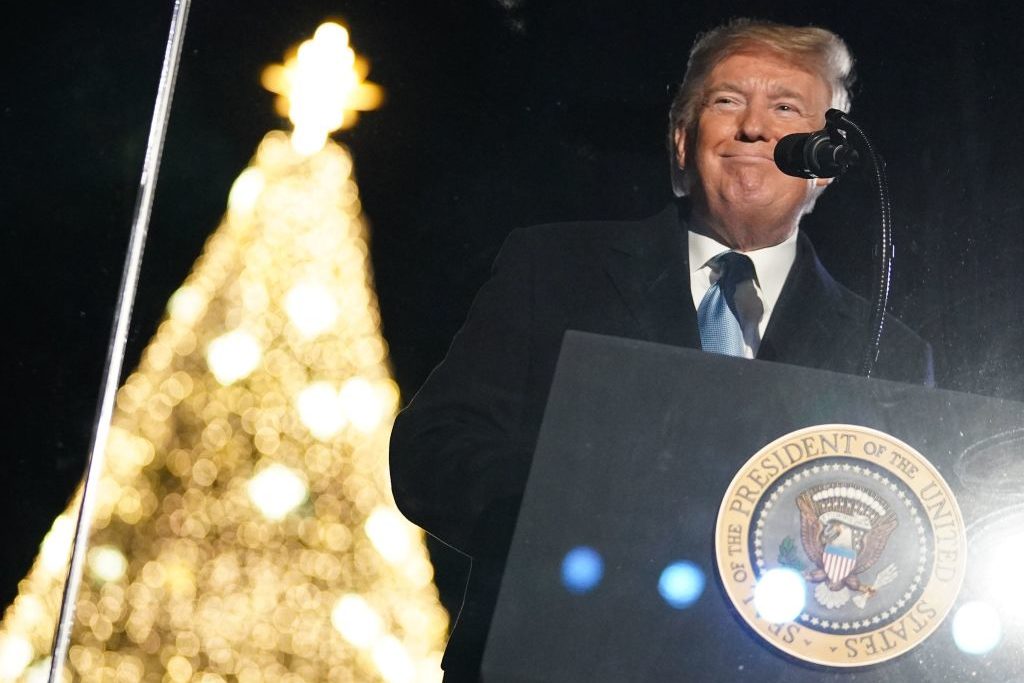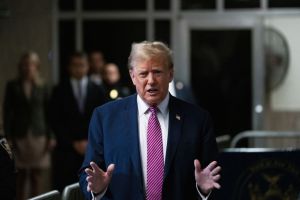You’ve succeeded in business, made it as a TV star and got yourself elected president. What could possibly top that? Donald Trump may have stumbled on the answer. He has, perhaps accidentally, become a religious leader.
Christianity has always played a major role in US politics. What’s new about Trump is the fervor he excites in his supporters, and how easily it can be combined with a kind of religious devotion. Trump fans bring crucifixes and rosaries to his rallies. The documentary The Trump Prophecy told the story of a man who had received a divine prophecy of Trump’s presidency; on the website Fine Art America you can buy a painting by Danny Hahlbohm, ‘You are not Alone’, depicting Jesus standing behind a seated Trump, two supportive hands on his shoulders.
Last month the Jericho March, described by organizers as ‘a massive national peaceful prayer rally protest’ on Trump’s behalf, came to Washington DC. Attendees blew shofars (ram’s horns), in imitation of the priests at the Old Testament Battle of Jericho, and sang ‘Amazing Grace’. The presidential helicopter passed above the stage to wild cheers. A succession of speakers announced that ‘This is the beginning of the Great Revival before the Antichrist comes!’ (conspiracy theorist Alex Jones), that ‘This is the beginning of a Christian populist uprising!’ (writer Lance Wallnau) and that ‘The victory has been established by Christ on the Cross! We pray to bring that victory into this present moment!’ (YouTuber Taylor Marshall).
Trumpian religion can’t be dismissed as a fringe phenomenon. During the impeachment process, two members of the House of Representatives compared the Democrats’ treatment of Trump to the trial of Christ. ‘Pontius Pilate afforded more rights to Jesus than Democrats have afforded this president,’ said one, while another quoted Christ’s words from the cross: ‘Father, forgive them, for they know not what they do.’ In 2019 the energy secretary, Rick Perry, described the President as ‘the chosen one’, adding: ‘If you’re a believing Christian, you understand God’s plan for the people who rule and judge over us on this planet in our government.’
It’s not just an American thing, either. One of the central figures in Trumpian Christianity is an Italian archbishop, Carlo Maria Viganò, who recently praised Trump as ‘the man who has strenuously opposed the establishment of the New World Order that is wanted by the children of darkness’. A prominent Nigerian politician, Femi Fani-Kayode, addressed Trump on Twitter after the election:‘Fea rnot. The battle belongs to the Lord. Every evil will be uncovered and you shall prevail!’
Trump’s original appeal to Christian voters was simple. He was their human shield — a defense against the Democratic party’s hostility to socially conservative believers. That became clear shortly before the 2016 election, when Trump invited church leaders and Christian activists to a meeting (a recording of which was leaked to Rolling Stone). If the US left had its way — so the Christian attendees feared — abortion provision would be expanded, transgender bathrooms would become mandatory, schools opposing same-sex marriage would have their funding pulled, care services run by nuns would be sued for refusing to provide employees with contraception — and so on. Trump assured his new friends that he would stop all of that.
So far, so transactional: if Christian leaders endorsed Trump, he would offer them protection in the culture wars. It was merely — to quote the title of Trump’s best-known book — the art of the deal. But even at that 2016 meeting, a more apocalyptic note could be heard. As it closed, Robert Jeffress, a Texas megachurch leader and Fox News contributor, announced that ‘this election is not a battle between Republicans and Democrats. It’s a battle between good and evil, light and darkness, righteousness and unrighteousness.’
Fighting political battles is not necessarily un-Christian. The classic example is St Thomas Becket, assassinated 850 years ago for his tooth-and-nail opposition to King Henry II. But Becket also loved his enemies — conflict with Henry, he said, felt like ripping his own heart out of his chest — and he was, in the end, resigned to God’s will: if he were going to be martyred, so be it. Trumpian religion has a different emphasis. It is all about winning.
Nobody typifies this more than Paula White, chair of Trump’s evangelical advi- sory board. ‘Lord,’ goes one of her charac- teristic prayers, ‘we ask you to deliver our president from any snare, any setup of the enemy… Any persons [or] entities that are aligned against the President will be exposed and dealt with and overturned by the superior blood of Jesus.’ After the election, White led a prayer service proclaiming that angels were coming to swing the vote in Trump’s favor. ‘The Lord says it is done. For I hear victory, victory, victory, victory. In the quarters of heaven. In the quarters of heaven. Victory, victory, victory, victory, victory, victory.’
Many Christians have been horrified by this new form of political spirituality. The gentle and thoughtful Southern Baptist leader Russell Moore was moved to say in 2016 that ‘Paula White is a charlatan and recognized as a heretic by every orthodox Christian.’ The divisions among conservative-leaning US Christians run deep. Last year, an eloquent editorial in Christianity Today called for Trump to be removed from office. ‘No matter how many hands we win in this political poker game,’ wrote the then-editor, Mark Galli, ‘we are playing with a stacked deck of gross immorality and ethical incompetence.’
Perhaps because criticisms of the President’s personal morality are unanswerable, Trumpian religion has often adopted a more mystical approach. The President may be no saint, his supporters say, but you don’t have to be a saint to be God’s instrument. Indeed, the Old Testament is full of examples of dubious characters being chosen by God. ‘King David had like 500 concubines, for crying out loud!’ as the Trumpian pundit Sean Hannity put it.
The idea of Trump as a divinely approved leader has appealed to more than a few Catholics who are dismayed by Pope Francis’s erratic pontificate. Feeling bereft of leadership, they have leaped onto the MAGA bandwagon. Archbishop Viganò has pronounced that Joe Biden’s victory in the election was ‘the most colossal electoral fraud in history’.
Most disturbingly, the alt-right has decided to join in. Take the podcaster Nicholas Fuentes, who fires off anti-Semitic jokes, has criticized an opponent as a ‘race traitor’ who ‘hates white people,’ and says of racial segregation: ‘Even if it was bad, who cares?’ At a pro-Trump rally last month, Fuentes briskly segued from calling for the expulsion of ‘every single last illegal alien’ to declaring: ‘The real struggle is not some battle between Republicans and Democrats. The real struggle is between good and evil. This is a spiritual war. It is a spiritual war between the Devil and the children of Jesus Christ.’ The crowd chanted back: ‘Christ is King!’
Although Trumpian religion may find it hard to recover from electoral defeat, it is unlikely to disappear completely. On both left and right, political movements are rediscovering the power of religious emotion to mobilize public support. Both Biden and the Italian populist Matteo Salvini, for instance, have brandished rosaries at political events. In the early years of the 21st century, many Christians feared that their faith would be marginalized, excluded from public life. But the real threat may be that one or other political faction manages to co-opt the faith for its own ends.
This article was originally published in The Spectator’s January 2021 US edition.


















